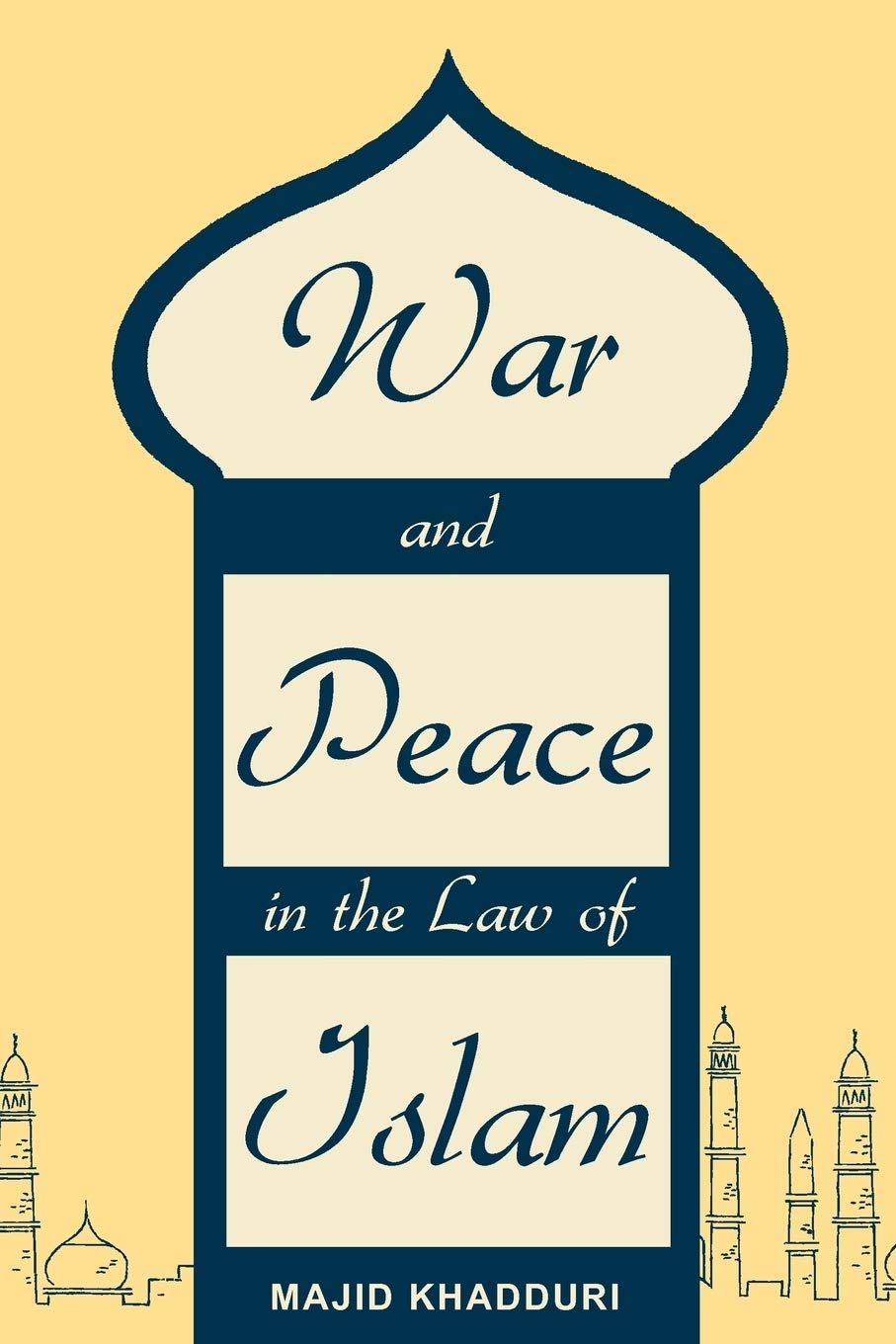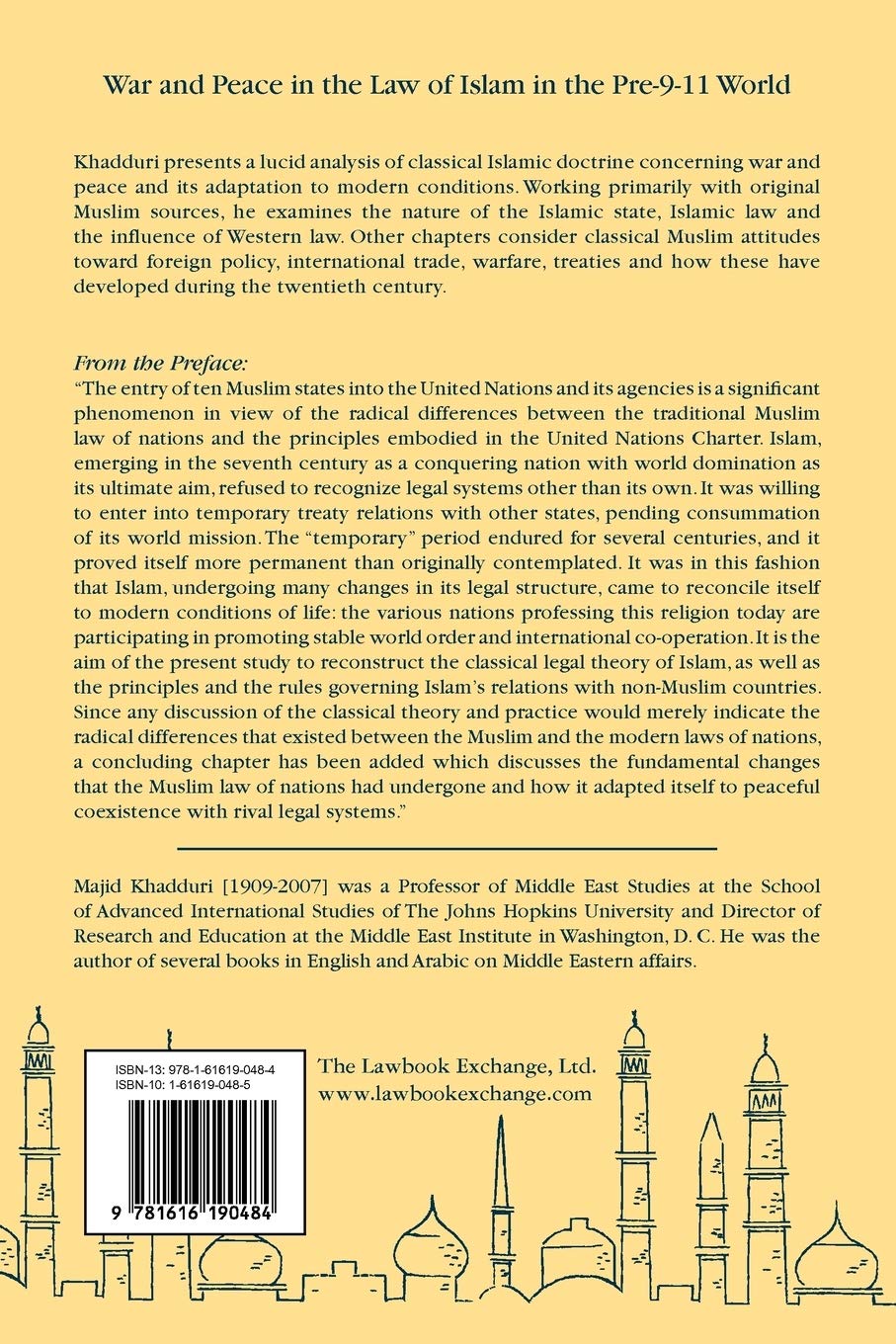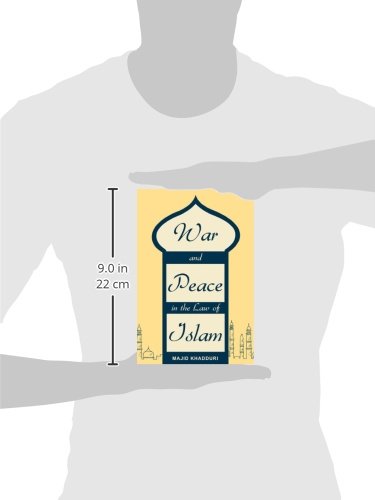Deliver to Ukraine
IFor best experience Get the App




Full description not available
H**T
An Indispensable Reference
Professor Khadduri's "War and Peace in the Law of Islam" is an indispensable reference for those who want to understand the immutable doctrine governing the relationship between the Umma (Muslim community) and the kuffar (non-Muslims). In this forthright and candid 1955 edition, Professor Khadduri updated his original 1941 text and examined this relationship at a time when 10 Muslim countries had entered the United Nations, providing context to an otherwise anomalous development in international relations between Dar al Islam (the abode of Islam) and Dar al Harb (the abode of war). Professor Khadduri provides the reader a clear, concise analysis in eminently readable language that is devoid of dissimulation. His discussion is both legal and historical, and draws from a variety of irrefutable sources. Khadduri's examination will be valuable to historians and diplomats alike, but should rightfully be absorbed by the general public as the lessons of his analysis will be ignored at our peril. I had been hoping to add this excellent manuscript to my library for years, but at nearly $100 per copy it was beyond my budget. At the rather accessible price of just over $20 (as of December 2013), this paperback version is a great addition to anyone's library. Highly recommended.
W**.
Excellent, Pre 9-11 Scholarship
The 1955 edition of "War and Peace in the Law of Islam" provides a pre 9-11 examination of Islam that is refreshingly devoid of the current era of political correctness and academic appeasement.Khadduri's manuscript, written for the Johns Hopkins Press, was reviewed by Professor Joseph Schacht, University of Leiden, Sir Hamilton Gibb, University of Oxford, Professor Phillip K. Hitti, Princeton University, Dean Phillip W. Thayer, School of Advanced Studies of the Johns Hopkins University, and Professor Leo Strauss, University of Chicago. Two quotes both set the tone and give insight to the unvarnished examination Khadduri subjects Islam:"Islam, emerging in the seventh century as a conquering nation with world domination as its ultimate aim, refused to recognize legal systems other than its own." P. vii"In Muslim legal theory, Islam and shirk (associating other gods with Allah) cannot exist together in this world; it is the duty of the imam as well as every believer not only to see that God's word shall be supreme, but also that no infidel shall deny God or be ungrateful for His favors (ni'am)."Khadduri lays out the insights needed to understand a Seventh Century Threat to the 21st Century. His book is organized as follows:Book 1 Fundamental Concepts of Muslim LawChap 1. Theory of the Statea. Society and the Stateb. The Juridical Basis of the Statec. A Divine Universal NomocracyChap 2. Nature and Sources of Lawa. Customary Law and Islamic Lawb. Nature of Islamic Lawc. Sources of Lawd. Schools of Lawe. The Shia DoctrineChap 3. The Muslim Law of NationsBook II The Law of War: The JihadChap 4. IntroductionChap 5. The Doctrine of Jihada. The Meaning of Jihadb. Jihad as Bellum Justumc. Jihad as Permanent Ward. The Shi'i and Khariji Doctrines of the Jihade. The Jihad and Secular WarChap 6. Types of Jihada. The Jihad Against Polytheistsb. The Jihad Against Apostasyc. The Jihad Against Baghi (an attempt at dissention)d. The Jihad Against Deserters and Highway Robberse. The Jihad Against Scripturaries (Jews, Sabians and Christians)f. The Ribat (Safeguarding the frontiers of dar al'Islam)Chap 7. Military Methodsa. The Jihadistsb. Command of the Jihadistsc. Conduct of FightingChap 8. The Initiation of Wara. The Call for Fightingb. Necessity of "Invitation"c. NegotiationChap 9. Land Warfarea. Prohibited Actsb. Treatment of Enemy Prisonersc. Spiesd. Treatment of the DeadChap 10. Maritime Warfarea. Islam and Sea Powerb. Muslim Law and the Seac. Rules and Practices of Naval Warfared. Naval OrganizationChap 11. Spoils of Wara. Meaning and Nature of the Spoilsb. Division of the Spoilc. Immovable Propertyd. Prisoners of Ware. SlavesChap 12.Termination of FightingBook III The Law of PeaceChap 13. IntroductionChap 14. Jurisdictiona. Persons: Believersb. Persons: Kafirs (Unbelievers) and Murtadds (Apostates)c. The Head of State: The Imamd. Muslim Territory: Dar al-Islame. Classification of Muslim TerritoryChap 15. Foreigners in Muslim Territory: Harbis and Musta'minsa. Foreigners and Muslim Lawb. The Harbi (One who belings to dar al-harb)c. The Aman (Pledge of Security)d. The Muista'min;s Rights and Obligationse. Termination of Amanf. Importance of AmanChap 16. Muslims in Non-Muslim Territorya. Non-Muslim Terriroty: Dar al Harbb. Conduct of the Muslim in a Non-Muslim Territory Under Amanc. Conduct of the Muslim in Non-Muslim Territory Without Amand. Muslim PrisonersChap 17. Status of Dhimmisa. Islam and Non-Muslim Subjectsb. Meaning of Dhimmic. Dhimmi Compact with Muhammadd. The Legislation of "Umare. Jizya and Kharajf. The Covenant of `Umarg. Dhimmi Rights and Obligationsh. ConclusionChap 18. Treatiesa. Treaty Making Powerb. Legal Nature of Treatiesc. Prophet Muhammad's First Treatyd. The Hudaybiya Treatye. Dhimmi Pacts as Constitutional Chartersf. Muslim Treaties Under Muhammad's Successorsg. General Characteristics of Treatiesh. Termination of TreatiesChap 19. Commercial Relationsa. Islam and Commerceb. Non-Muslim Trade with Dar al'Islamc. Muslim Trade with Dar al'Harbd. Significance of Foreign TradeChap 20. Arbitrationa. Arbitration Before Islamb. Islam and Arbitrationc. Arbitration between Ali and Mu'awiyad. Significance of ArbitrationChap 21. Diplomacya. Muslim Conception of Diplomacyb. Emissariesc. Reception of Emissariesd. Functions of Diplomatic Missionse. Muslim Diplomacy and World Politicsf. Importance of DiplomacyChap 22. Neutralitya. Islam and Neutralityb. The Status of Ethiopiac. Nubiad. CyprusChap 23. Epiloguea. Changes in the Character of Dar al'Islamb. Recognition of Christendom by Islam Under Ottoman Rulec. Christendom's Attitude Toward the Ottoman Empired. The Ottoman Empire and the Modern Law of Nationse. Integration of Islam into the Family of Nationsf. The Secularism of Law and Stateg. ConclusionGlossary of TermsBibliography (Supplies the original sources and thefundamental "modern" studies that have a directbearing on the subject of war and peace in Islam)IndexOver all, this 1955 publication, reprinted in June of 2007, will be an invaluable reference for analysts and researchers.
Trustpilot
3 weeks ago
4 days ago